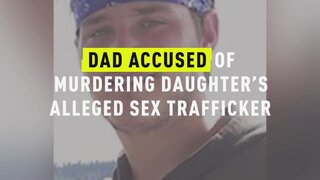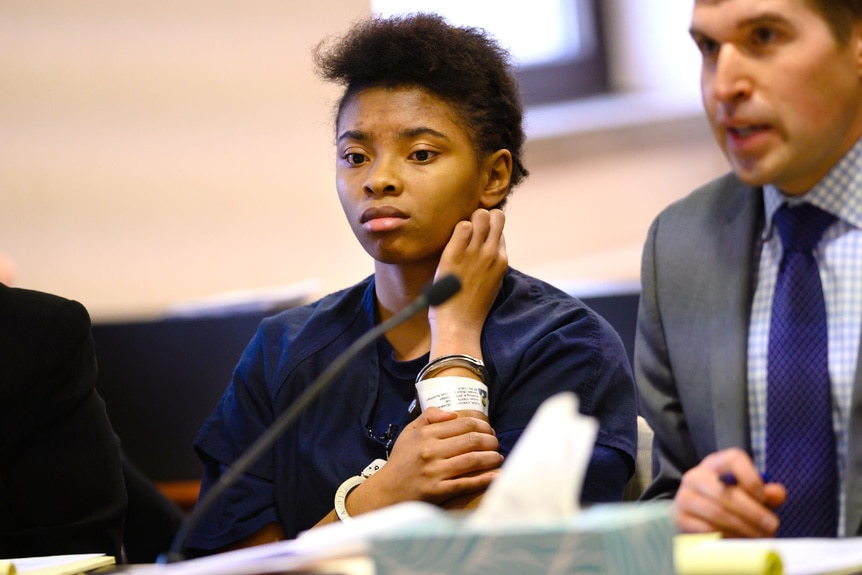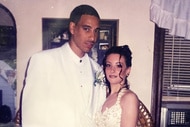Sex Trafficking Victim Chrystul Kizer Sentenced to Prison for Killing Alleged Abuser as a Teen
Many fought to have the then-17-year-old defendant freed after she fatally shot her alleged abuser and set his body on fire.
A woman who killed her accused sexual abuser as a teen has been sentenced in a case that drew national public interest.
On Monday, August 19, 2024, Chrystul Kizer, 24, was sentenced to 11 years behind bars for the 2018 murder of Randall Volar, 34, who was found brutally murdered in his Kenosha, Wisconsin home, according to NBC News. At the time of his death, Volar was under investigation and facing 40 years in prison for a slew of charges related to the sexual abuse of minors and child pornography.
Kizer — who was found to be one of Volar’s alleged long-time victims — was 17 when she killed Volar, claiming she shot him and set his body on fire in self-defense.
Though Kizer was initially charged with first-degree murder and faced a life sentence for the killing, it came at a time when attitudes by law enforcement began shifting over how victims of sex crimes should be penalized for crimes committed when in the throes of abuse.
In May 2024, she pleaded guilty to charges of reckless homicide, which allowed the defendant to avoid a trial and a hefty life sentence.
How did Randall Volar die?
On June 5, 2018, police found the “badly charred and unrecognizable” body of Randall Volar dead in his burning home. He was slumped over in his living room chair and had sustained two fatal gunshot wounds to the head.
Volar was then awaiting trial for child rape charges and was accused of raping multiple teenage girls, some as young as 12, as previously reported by Oxygen.com. Nearly two dozen homemade videotapes were seized from Volar’s home, showing Volar having sex with Black and underage females, including Kizer.
Volar was killed before he could found guilty in a court of law.
Kizer, who is Black, told authorities she met Volar at age 16 on a now-defunct classifieds website fostering solicitation. The man reportedly showered the minor with gifts before allegedly pimping her out to random men in various Milwaukee motels, pocketing money for the illegal services.
On the night of the murder, Kizer said she shot Volar in self-defense using a .380-caliber handgun that her boyfriend gave her for protection.
“He started to touch my leg, and then, like, I had jumped and [told] him that I didn’t want to do that," Kizer said of Volar. "I tried to get up, to get away from him, but I had tripped, and I fell on the floor, and he had got on top of me. And he was trying to, like, rip my pants off, my jeans that I had on.”
According to NBC News, Kizer said she’d also been drugged by Volar.
Investigators said Kizer left after stealing Volar’s BMW and later posted videos online in which the teen claimed she wasn’t afraid to “kill again,” referring to a “rich, white individual.”
Why did the case spark national conversation?
Defense attorneys claimed Kizer shouldn’t have been held criminally liable for Volar’s death due to a 2008 Ohio law that absolved sex trafficking victims of “any offense committed as a direct result” of the sex crimes, according to The Associated Press. Prosecutors, however, said such statutes didn’t extend to homicide, especially since they claimed Volar’s murder was premeditated.
Kizer’s case came at a precarious time at the peak of the Black Lives Matter movement and aligned with the 2021 acquittal of Kyle Rittenhouse, the teen charged with shooting three and killing two at a Kenosha Black Lives Matter protest the previous year.
The Wisconsin Supreme Court decided in July 2022 that Kizer could claim self-defense at her prospective trial. It was then on her and the defense to prove that she killed Volar as “a direct result” of the purported sex trafficking.
Victim advocates pushed to have charges against Kizer dropped, given the teen’s status as a sex trafficking victim, and prompted the creation of Chrystul Kizer Defense Committee. Following Kizer’s arrest, groups like the Chicago Community Bond Fund, Survived & Punished, and the Milwaukee Freedom Fund raised $400,000 for the teen’s bond.
What happened at sentencing?
Kizer was sentenced to 11 years behind bars and will be subjected to five years of supervised release, according to NBC News. As part of her plea deal, Kizer will also have to submit her D.N.A. for the record.
Kizer, who was reportedly baptized in jail, asked for leniency at Monday’s hearing, according to the Milwaukee Journal Sentinel.
“I don’t know where to start, but I'm asking for your generosity in my sentence today,” she told the court. “I understand that I committed sins that put the Volar family in a lot of pain.”
Kenosha County Judge David Wilk gave Kizer 570 days (about one and a half years) credit toward her sentence, according to The Associated Press. But not before issuing a statement to the defendant, as reported in the Sentinel.
“The court is well aware of your circumstances surrounding your relationship with Mr. Volar,” said Wilk. “You are not permitted to be the instrument of his reckoning. To hold otherwise is to endorse a descent into lawlessness and chaos.”
Kizer is scheduled to appear for a restitution hearing at a later date.















































